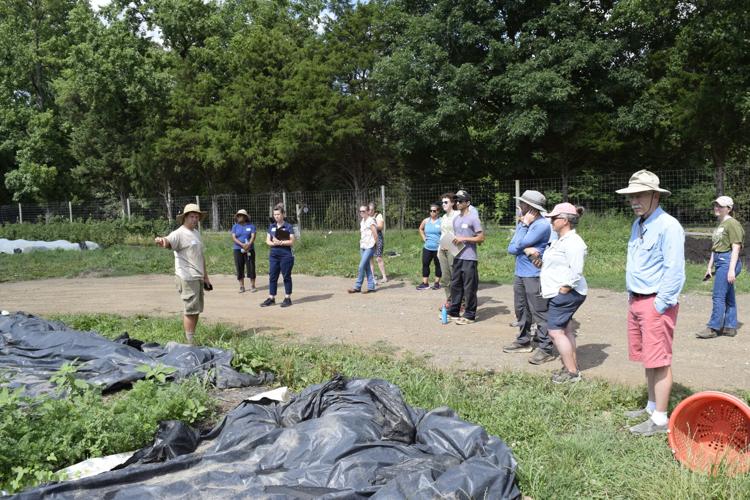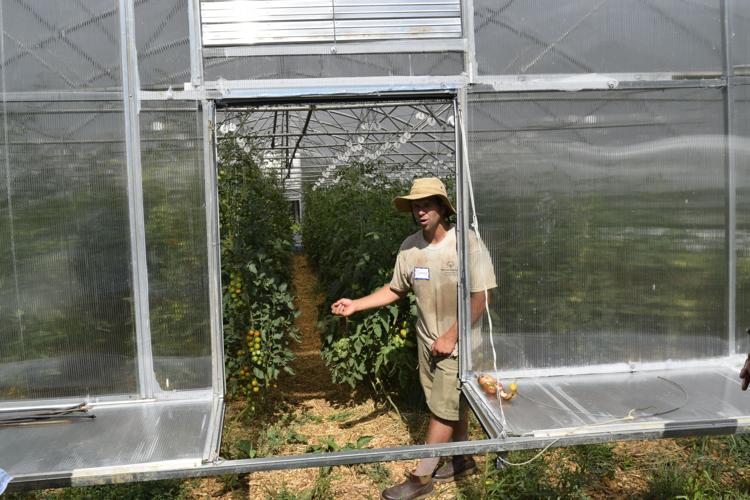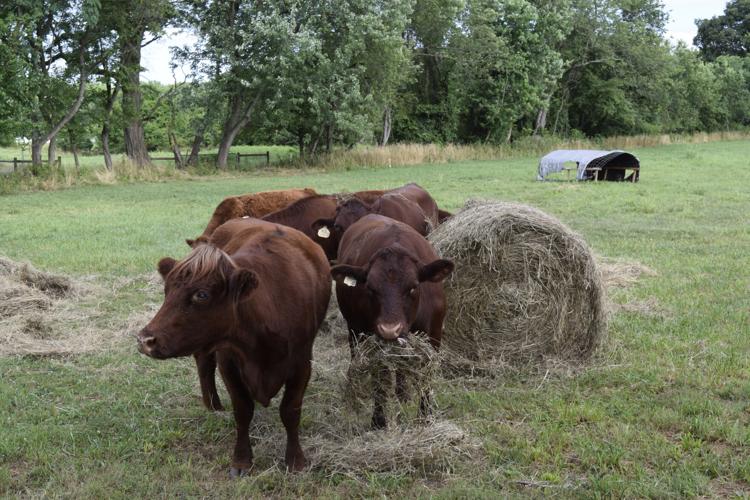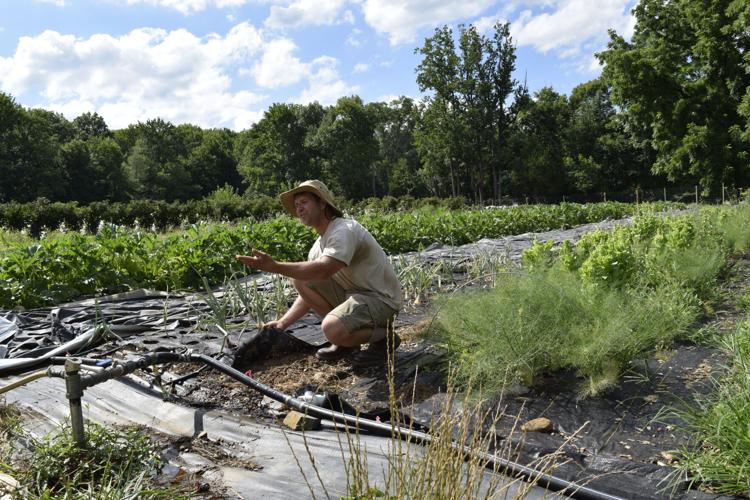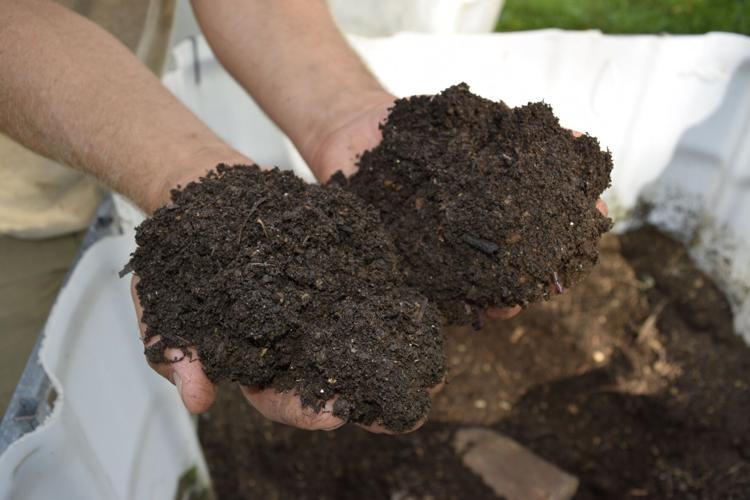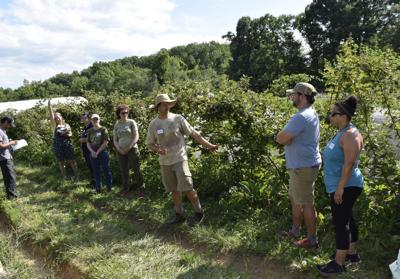HAVRE DE GRACE, Md. — For Tommy Shireman, farming means more than growing food for profit.
He sees it as a spiritual practice.
“Farming is really a mission for me,” Shireman said during a Future Harvest-sponsored field day he hosted on Third Way Farm that he owns and operates with his wife, Michelle.
He referred to the biblical admonition from Genesis that humans are to care for the earth.
“That’s why I do it,” he told a group of about 15 attendees on the sunny, hot afternoon of July 11.

Tommy Shireman describes his trellised hoophouse tomato production system at Third Way Farm on July 11, 2024.
Becoming a farmer was no obvious choice for Shireman, who said he grew up in Lancaster County, Pennsylvania, as a typical suburban kid, playing soccer and sailing on the beach.
“My friends and I were into hip-hop music and hooking up cars, about as opposite of agricultural or ‘country’ as you can get,” he said.
Because his family was in the car business, it was the career most expected of him.
“But I felt God call me in a different direction,” Shireman said.
His path into farming came through various experiences in ministry, including mentoring youths and taking mission trips around the world.
He was on a jungle farm in Malaysia when the inspiration came to him that farming, combined with mentoring, would bring it all together for him.
It has led him to own what is today a thriving 67-acre vegetable, fruit and livestock farm, with a commitment to caring for the land as well as providing work and learning opportunities for young interns.
The name, Third Way Farm, comes from the way of non-violence shown and taught by Jesus, Shireman said.
Of possible ways to resist violence in an oppressive system, he said, the “third way” goes beyond the two most common that have shaped human history: responding with violence or doing nothing. Instead, the third way finds a creative alternative.
Shireman named industrial farming as a cause of harm to soil, water, air and communities.
“A lot of violence is done in our agricultural system,” he said.
Shireman sees his farming practices as a positive alternative, especially his dedication to building soil through no-till methods with a minimum of chemicals.
“It’s more about guidance and less about control,” Shireman said. “We do as little as we can to let soil and nature do its work best.”
There’s still plenty of work involved in running the farm, as guests learned throughout the field day.
As Shireman led them on a tour of the farm’s vegetable and fruit beds, he shared his no-till strategies and how they’ve evolved over the 10 years since he started farming.

Tommy Shireman explains no-till bed preparation at Third Way Farm on July 11, 2024 to participants on a tour sponsored by Future Harvest-The Chesapeake Alliance for Sustainable Agriculture.
‘Tarps Are Our Tillers’
Starting out in 2014, Shireman said he used a tiller that ran off the back of his tractor to prepare the vegetable beds.
But within a few years, he noticed crops seemed to be getting worse, a trend he believes was caused by tillage.
A big challenge was that “we were really at the mercy of the rain,” he said. “We couldn’t till when it was raining.”
Along with learning more about how tillage destroys soil structure, he began to make the switch to no-till.
At first, Shireman tried the “sheet mulching” method of preparing beds, which involves covering the soil in layers with a material such as cardboard or newspaper.
“It worked fine, but man, it was a lot of work,” he said.
Instead, black tarps laid onto recently harvested beds became the main method of preparing the ground for the next planting.

Tommy Shireman of Third Way Farm on July 11, 2024 shows how he uses landscape fabric to suppress weeds in the onion bed.
By 2019 the farm had been switched completely to no-till.
The black tarps draw heat, which serves to kill weeds without doing much harm to microbial populations in the soil, Shireman said.
“Tarps are our tiller,” he said.
The tarps have some limitations. In early spring when weather is still cool, for example, weeds can survive underneath a tarp. In that case, Shireman has to resort to some light tillage, using a power harrow with his BCS walk-behind tractor.
The harrow does what he called “minimal tillage” with tines that spin horizontally to a depth of 4 or 5 inches. The implement is designed not to scramble the soil layers, but keep the structure mostly intact.
A flail mower attachment is another key piece of equipment on the farm, used to mow down beds after a vegetable has been harvested and before a tarp is applied. The mower shreds plant matter into a fine material helping it break down quickly in the soil.
The reverse side of the tarps is white, and sometimes used to reflect the sun to help keep a crop cooler in the summer. Shireman said he found that works especially well with carrots.
Drip irrigation tape delivers water to vegetables and fruits from wells on the farm. Since the water supply is limited, he uses a “pulse" irrigation system which waters crops more often for shorter periods of time.
For example, he showed a bed of summer squash that he was watering twice every other day for 8-10 minutes at a time, which he believes works as well as the traditional method of deep watering over longer periods.
“Figuring out how to manage crops with less water is crucial, he said.
Healthy soil structure in the no-till system is one of the keys to water management.
“It’s not a silver bullet,” Shireman said of the tarp no-till system. “But if you apply it well, it makes life better.”
Among other topics Shireman covered during the three-hour tour were his practices of companion planting, cover cropping, generating compost on the farm using worm colonies that feed on manure, and the farm’s livestock operation that includes a small herd of Red Devon feeder cattle finished on pasture, several hundred pastured laying hens, and pigs that forage in the woodland.

These Red Devon cattle seen July 11, 2024 on Third Way Farm are finished on the pasture of a neighbor, who let's them graze for free. They normally wouldn't be given hay during the grazing season but a misunderstanding resulted in the paddocks being mowed earlier this summer.
In addition to the gamut of fruits and vegetable growing on the farm, flowers play a big role by attracting beneficial insects and serving as a popular draw for customers and CSA members.
Shireman gave Michelle credit for growing an array of flowers to complement the edible produce.
“We believe the more flowers you can have on the farm, the better,” he said.
Shireman believes in as much biodiversity and as many perennial crops as possible. The farm includes a mix of fruit trees and a wide selection of berry crops.
“Berries are probably one of the most profitable things we do,” he said.
Participants in the field day included a few experienced farmers as well as some new and aspiring ones.
Ravi Mattaparthi and his wife, Krishna, came from New Freedom, Pennsylvania, where they bought a small farm two years ago.
Mattaparthi said they grow produce for their own use, but have plans to expand on their 2-acre plot and begin doing some marketing.
Jana Sprinkle of Sprinkleberry Farm and Education Center in Bowie attended as a self-proclaimed new farmer.
“I want to soak up knowledge,” she said.

Tommy Shireman on July 11, 2024 shows a handful of worm compost produced on Third Way Farm. This amount contains more living organisms than there are humans on Earth, Shireman said.


